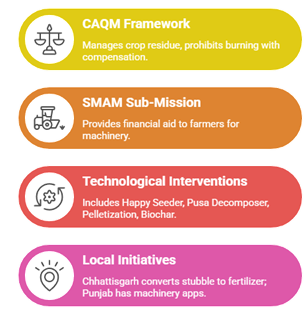19-Sep-2025
Stubble Burning in India
News in Shorts
Why in News?
To tackle Delhi's pollution, the SC directed Punjab, Haryana & UP to fill State Pollution Control Board vacancies in 3 months and urged the Union Govt to penalize stubble burning.
Stubble Burning
- The practice of burning leftover straw after harvesting crops like paddy & wheat, b/w late Sept and early Nov.
- Reasons:
- Mono-Cropping: MSP system favors wheat & rice, which leads farmers to burn crop residues to prepare fields quickly.
- Cost-Effectiveness: Cheaper than other disposal methods like shredders or balers.
- Weed Management: Fire eliminates weeds & seeds, reducing herbicide use.
- Limited Options: Lack of infrastructure & awareness of alternatives like composting or bioenergy.
- Climate Impact: Erratic monsoons & rising temperatures delay harvests, pushing farmers to burn stubble.
- Impacts: Releases pollutants (PM10, PM2.5, NOx, methane, CO, VOCs), contributes to GHG emissions, and depletes soil nutrients, moisture & microbes.
|
Challenges in Controlling Stubble Burning |
Way Forward |
|
|

